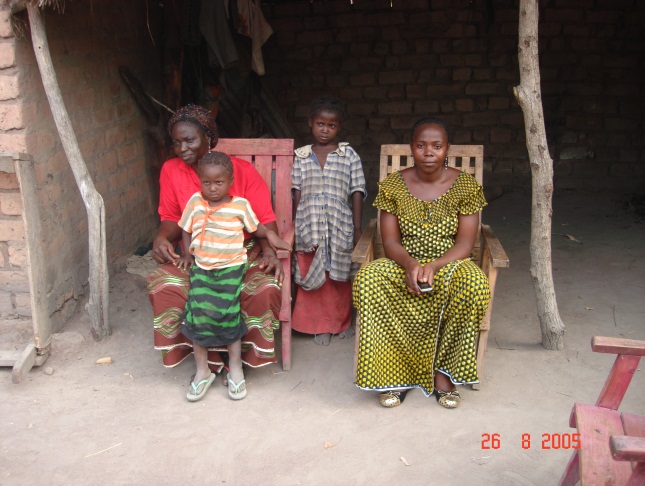Miandoum, Chad—Phanuelle Larebe, a seamstress, and Juliette Ndoumhorum, a shopkeeper, are working to keep their village in the Eastern Logone Region in Chad safe from malaria. They have seen the devastating impact of this disease on their neighbors and families.
“Malaria is a serious illness that is rampant in our villages,” said Larebe, whose sewing shop is part of the Kemkar woman’s group. “Above all, it touches children and pregnant women.”
Larebe and Ndoumhorum were part of a group of 21 women who volunteered to be community health workers to educate parents on actions they can take to protect their families from malaria. Larebe, 22, and the mother of two small children, and Ndoumhorum, a 42-year-old mother of nine, have both lost family members to suspected malaria.
In Chad, malaria was the leading cause of disease (31 percent) at health centers and death at hospitals (21 percent) in 2009, with an estimated 500,000 malaria cases every year. Through Africare and Malaria No More, two community-based efforts supported by the ExxonMobil Foundation, the community health workers participated in an education program conducted by Jhpiego on ways to prevent malaria infection and sickness. In the project’s four targeted districts, 27,850 confirmed cases of malaria were reported.
Chad is the newest country where Jhpiego is working to prevent the needless deaths of women and family members from malaria. In its 40 years, Jhpiego has supported malaria prevention and treatment programs in more than 25 countries in sub-Saharan Africa and Asia.Building on the successes and achievements of Jhpiego’s malaria prevention work in Angola and Nigeria, the ExxonMobil Foundation offered to help implement a malaria prevention and treatment program in districts along the Chad-Cameroon oil pipeline. This effort will address all aspects of malaria, including prevention, diagnostics and treatment, targeted at pregnant women and children under the age of five.
Jhpiego develops innovative solutions to address today’s global health challenges and works with communities to increase frontline health workers’ ability to deliver lifesaving care. As part of its strategy to strengthen malaria prevention and treatment services in Chad and Cameroon, Jhpiego is collaborating with the Ministries of Health to develop and update national guidelines and policies and to share them with frontline health care providers working in regional and district facilities.
After participating in a Jhpiego-supported training program in the Eastern Logone Region of Chad, community health workers Larebe and Ndoumhorum met with their women’s groups, Kemkar and Melom, which are also supported by Africare to help women develop skills that can produce income for their families. Ndoumhorum reported that they also briefed township officials on ways they could support malaria prevention initiatives.
“Then we raised awareness with our families, at churches, in households during home visits,” said Larebe.
The pair spoke at public meetings in 38 of the 48 villages in their township, reaching more than 17,000 people as of February 1, 2013.
“We talked about how malaria is transmitted through mosquito bites and why it is important to sleep under insecticide-treated nets to protect oneself against the mosquitoes,” said Larebe, “especially pregnant women and children.”
A survey conducted between November 2010 and January 2011 showed that less than 12 percent of children under five sleep under an insecticide-treated bed net, and only 15 percent of pregnant women receive the recommended preventive treatment for malaria—far short of the internationally accepted standard of 80 percent.
As part of their educational outreach, the community health workers encourage pregnant women to attend prenatal care services at their local health facility so they can benefit from Fansidar, a medication that pregnant women take intermittently to protect themselves from getting malaria.
The women also went house to house to check and see if families were using the insecticide-treated bed nets that had been distributed for free in the villages.
“Most of households had received them, but some used them and others didn’t so we explained the importance of sleeping under the insecticide-treated mosquito net,” said Larebe.
Ndoumhorum added, “We advised parents that in case of fever, especially for children, to go to the health center where they can test for malaria and give effective medication.”
The community health workers have learned that their visits sensitized people to the risks of malaria and prompted them to act to protect themselves. “We worked with the nurse from the health center who told us that the number of pregnant women who come for prenatal consultation and the number of sick people who come for malaria consultation have increased,” said Ndoumhorum.
Eager to build on their success, Larebe and Ndoumhorum look forward to attending additional trainings supported by Jhpiego so they can educate and equip other women’s groups with anti-malaria messages.
“Then we can cover many villages,” said Larebe, proudly.
“We thank Jhpiego, Africare, Malaria No More and ExxonMobil for their support,” said Ndoumhorum.




